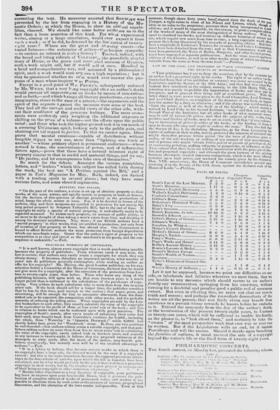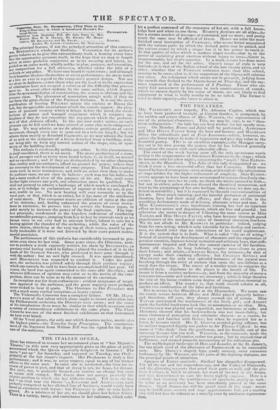PHILHARMONIC CONCERTS.
TI1E fourth concert, on Monday last, presented the following scheme.
PART I.
Sillt01113 (No. compo,ed for Ia., Plinartnottie Soeioty,
terthihatim! with SC■111.1.1.■<•. 1)■■■• to .1,1■,'" Mrs. Itisaoe. Mi-s ti. I:. II Mr, 110aN- cAsri.E.and Slr ISALFE, tutu O0 iril PARI Overthre (Per
:■ecne v:0,11,1,4, pre ; the Solo Park !,!, 1:1.oFF, HORN- C.lsTI
Cotivert Vi"lot1.7V110, Mr. its A NN (first nrperiormahee)
Teizetto, Mrs. Ilholue, Miss NI, II. IIAwKs, and Mr. /10RN CASTLE,"Mi lasei" (17 Battu di Pruserpi4o)
EsEinoerg. WFVF.R. atraur,.
ilAVsMANN.
WINTER.
feitto, Flute, Mr. Elictsremstents•(Vint note tor the KW of Hanover.) in winch is introduced HAYDN'S Na-
11E1 Omit Hymn
Selections from Goalie:au) Tell, the Solo l'arts by Mrs Bimior, Miss M. B. Ilswes, Mr. BRIM. Mr. HORN CASTLE, Mr IIKADBURY.emot Mr. ILtrav ROSSINI. Leader, Mr. Loom—Conductor, Mr. MOSCIIELES. The principal feettire, if not the principal attraction of this concert, was BEETHOVEN'S whole.act Sinfonia. Veneration for its author's genius induces us to give this extraordinary work a hearing every time that the opportunity presents itself, in the hope that we may at length arrive at some probable conjecture as to its meaning and intent, re- garded as an entire work, wholly unlike in plan, purpose, and execution, any composition for a full orchestra, whether under the title of a siorouia or anyother. We have now heard it eight times ; and although fresh beauties disclose themselves at every performance, we areas much at a loss as ever if) regard to the compuset s general design. Nor are we alone in darkness—even those who are the lotolost in the expression of admiration have not essayed a solution of the difficulty that presses upon us. In every other sinfonia by the slime author, which departs from the accustomed plan of construction, the reason is obvious and the purpose clear. The pleasures of association mingle with, if they do not form the great charm of the Pastoral Sinfonia. It is not the mere gratification of hearing Wtssatars mimic the cuckoo or Muss the lark, but the agreeable associations which the sounds suggest the plea- sures of pastoral scenery which it brings before the mind, the recol- lections of serene and tranquil enjoyment which it conjures up, brighten if they do not constitute the enjoyment ..vhich the perform- once of that sinfonia affords. In the one now under notice, no such pleasure can be felt until we have arrived at some clue to its composer's design. We may admire, as we do admire, certain positions of every movement, though every one is spun out to a tedious length ; but we admire them merely as detached fragments, as we may admire the form of an arch or the sculpture of a frieze detached from a building, with- out being able to form any correct notion of the shape, size, or sym- metry of the building itself.
This sinfonia is confessedly unlike any other. In this circumstance, in itself considered, there is no merit. The mere production of a num- ber of passages such us never were heard before, is, in itself, no marvel and no excellence ; and if they ore distinguished by no other character than crudity and uncouthness, afoul no ground for praise, unless they are necessary to the development of some purpose. That BEETHOVEN wrote such in mere wantonness, and with no other view than to make his auditors stare, we are slow to believe : such was not his habit—he bad a more exalted view of the purpose of his art. But, until some further light crosses our path, our admiration must be qualified. We shall not pretend to admire a landscape of which much is enveloped in mist, or to indulge in exclamations of rapture at what we are, at pre. sent, unable to see. No new hearing will ever reconcile us to the vocal part, or that which is so called, for it has none of the attributes of vocal music. The composer wants an addition of noise at the end of his sinfonia ; and, having exhausted the powers of every instru- ment in existence, be presses into his service the human organ, in order merely to increase the power of the final explosion. The hap- less principals, condemned to the hopeless endeavour of combining unrombinable passages, jumping from key to key by intervals such as no human voice or ear ever bad to attempt before labour in vain for a hearing against the thunder of the orchestra ; while the noise of the entire chorus, shrieking at the very top of their voices, would be per- fectly intolerable if it were not drowned by their inure potent instru- mental associates.
The performance of this sinfonia has considerably increased in pre- cision even since its last trial. Some years since, the Directors, anxi- ous to produce a work expressly written for them by BEETHOVEN, (a previous trial having ended in failure,) placed the conduct of it in the bands of Sir GEORGE SMART, who professed to have gone through it with the author : but no new light ensued. It was again abandoned,
until MOSCHELES was requested to conduct it. Under his guid- ance, the orchestra was piloted safely through their perilous voyage ; which can scarcely be said to have been accomplished till last year. Of course, the band was again committed to the same able direction ; and whatever difference of opinion may exist as to the merits of the com- position, there can be none as to the manner of its execution.
Its reception was far from enthusiastic : evident symptoms of weari- ness appeared in the audience, and the great majority most probably never wished to hear it again. The Overture to Der Frieschutz met with a much more cordial reception—it hearty encore. The Violoncello Concerto was a complete failure. Of Mr. Haus- ases's want of that talent which alone ought to insure admission into the Philharmonic orchestra, the Directors were aware ; and the cause of his introduction there must be similar to that which occasions such *variety of extraordinary exhibitions in the same place. The Flute Concerto was one of the most finished exhibitions on that instrument we have ever heard.
Of the Vocal pieces, the only one which deserves notice, merits also the highest praise—the Terzetto from Proserpina. The commence- ment of the fragment from William Tell was the signal for the depar- ture of the audience.



























 Previous page
Previous page